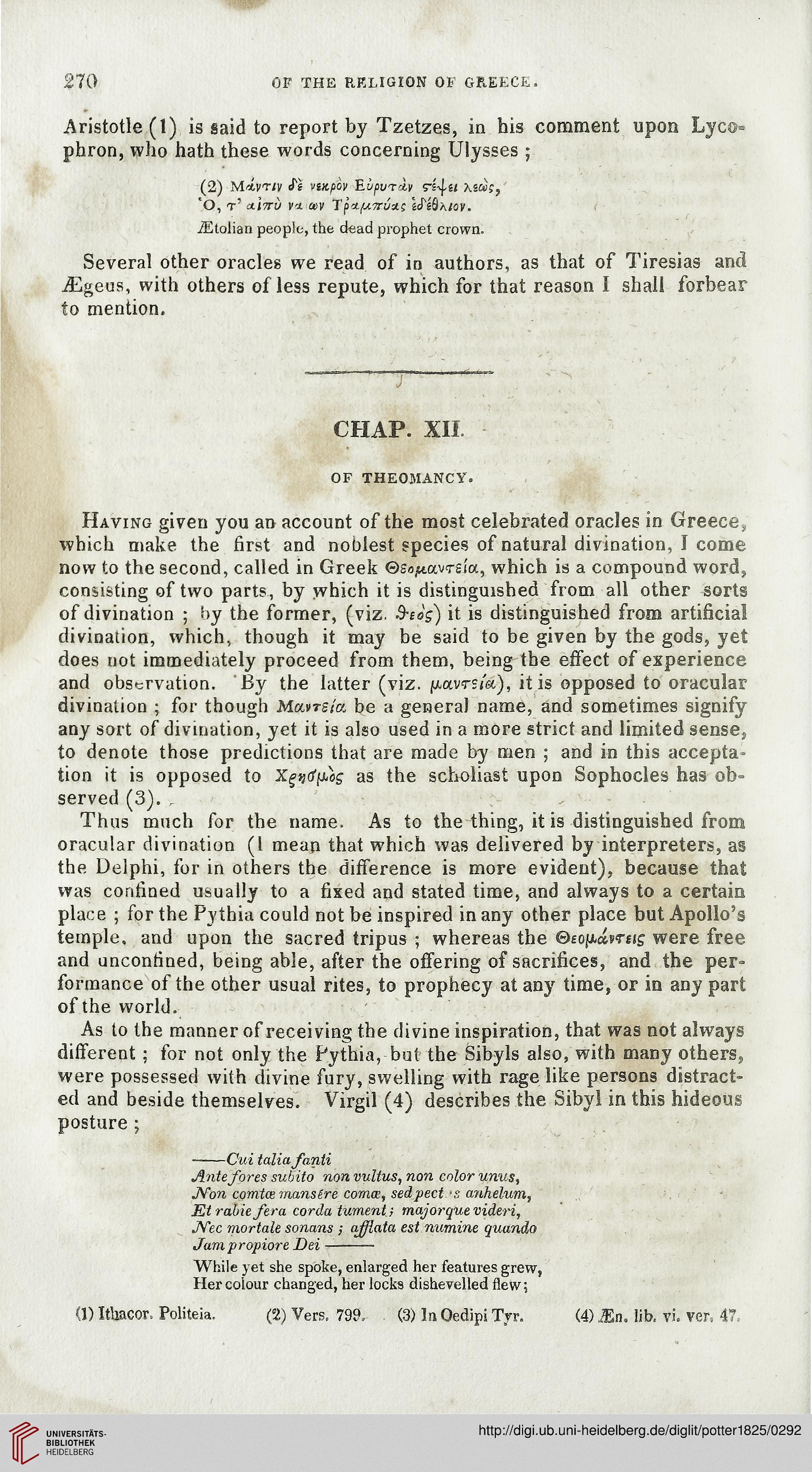270 of the religion of greece.
Aristotle (1) is said to report by Tzetzes, in his comment upon Lyco-
phron, who hath these words concerning Ulysses ;
(2) MrtVT/V S% VlKpOV EupvT'tV Ti-^it XIUS,
'O, t' olittu oov Tp*(j.7Tuzz gcTefla/ov.
iEtolian people, the dead prophet crown.
Several other oracles we read of in authors, as that of Tiresias and
iEgeus, with others of less repute, which for that reason I shall forbear
to mention.
CHAP. XII.
of theomancy.
Having given you an account of the most celebrated oracles in Greece,,
which make the first and noblest species of natural divination, I come
now to the second, called in Greek ©sojuavrsi'a, which is a compound word,
consisting of two parts, by which it is distinguished from all other sorts
of divination ; by the former, (viz. S-eos) it is distinguished from artificial
divination, which, though it may be said to be given by the gods, yet
does not immediately proceed from them, being the effect of experience
and observation. By the latter (viz. jxavrs/k), it is opposed to oracular
divination ; for though Matrsia be a general name, and sometimes signify
any sort of divination, yet it is also used in a more strict and limited sense,
to denote those predictions that are made by men ; and in this accepta-
tion it is opposed to Xgntfpes as the scholiast upon Sophocles has ob-
served (3). - .
Thus much for the name. As to the thing, it is distinguished from
oracular divination (I mean that which was delivered by interpreters, as
the Delphi, for in others the difference is more evident), because that
was confined usually to a fixed and stated time, and always to a certain
place ; for the Pythia could not be inspired in any other place but Apollo's
temple, and upon the sacred tripus ; whereas the Geopavrti; were free
and unconfined, being able, after the offering of sacrifices, and the per-
formance of the other usual rites, to prophecy at any time, or in any part
of the world.
As to the manner of receiving the divine inspiration, that was not always
different ; for not only the Pythia, but the Sibyls also, with many others,
were possessed with divine fury, swelling with rage like persons distract-
ed and beside themselves. Virgil (4) describes the Sibyl in this hideous
posture ;
-Cut talia fanti
Ante fores subito non vultus, non color unus,
JVon cornice mans&re comce, sedpect's anhelum,
Etrabie fera corda tument; major que viden,
JYec mortale sonans ; ajjflata est numine quundo
Jampropiore Dei-
While yet she spoke, enlarged her features grew,
Her colour changed, her locks dishevelled flew;
(1) Ithacor. Politeia. (2) Vers. 799, (3) In Oedipi Trr. (4) Mn. lib, vi. ver, 47,
Aristotle (1) is said to report by Tzetzes, in his comment upon Lyco-
phron, who hath these words concerning Ulysses ;
(2) MrtVT/V S% VlKpOV EupvT'tV Ti-^it XIUS,
'O, t' olittu oov Tp*(j.7Tuzz gcTefla/ov.
iEtolian people, the dead prophet crown.
Several other oracles we read of in authors, as that of Tiresias and
iEgeus, with others of less repute, which for that reason I shall forbear
to mention.
CHAP. XII.
of theomancy.
Having given you an account of the most celebrated oracles in Greece,,
which make the first and noblest species of natural divination, I come
now to the second, called in Greek ©sojuavrsi'a, which is a compound word,
consisting of two parts, by which it is distinguished from all other sorts
of divination ; by the former, (viz. S-eos) it is distinguished from artificial
divination, which, though it may be said to be given by the gods, yet
does not immediately proceed from them, being the effect of experience
and observation. By the latter (viz. jxavrs/k), it is opposed to oracular
divination ; for though Matrsia be a general name, and sometimes signify
any sort of divination, yet it is also used in a more strict and limited sense,
to denote those predictions that are made by men ; and in this accepta-
tion it is opposed to Xgntfpes as the scholiast upon Sophocles has ob-
served (3). - .
Thus much for the name. As to the thing, it is distinguished from
oracular divination (I mean that which was delivered by interpreters, as
the Delphi, for in others the difference is more evident), because that
was confined usually to a fixed and stated time, and always to a certain
place ; for the Pythia could not be inspired in any other place but Apollo's
temple, and upon the sacred tripus ; whereas the Geopavrti; were free
and unconfined, being able, after the offering of sacrifices, and the per-
formance of the other usual rites, to prophecy at any time, or in any part
of the world.
As to the manner of receiving the divine inspiration, that was not always
different ; for not only the Pythia, but the Sibyls also, with many others,
were possessed with divine fury, swelling with rage like persons distract-
ed and beside themselves. Virgil (4) describes the Sibyl in this hideous
posture ;
-Cut talia fanti
Ante fores subito non vultus, non color unus,
JVon cornice mans&re comce, sedpect's anhelum,
Etrabie fera corda tument; major que viden,
JYec mortale sonans ; ajjflata est numine quundo
Jampropiore Dei-
While yet she spoke, enlarged her features grew,
Her colour changed, her locks dishevelled flew;
(1) Ithacor. Politeia. (2) Vers. 799, (3) In Oedipi Trr. (4) Mn. lib, vi. ver, 47,




